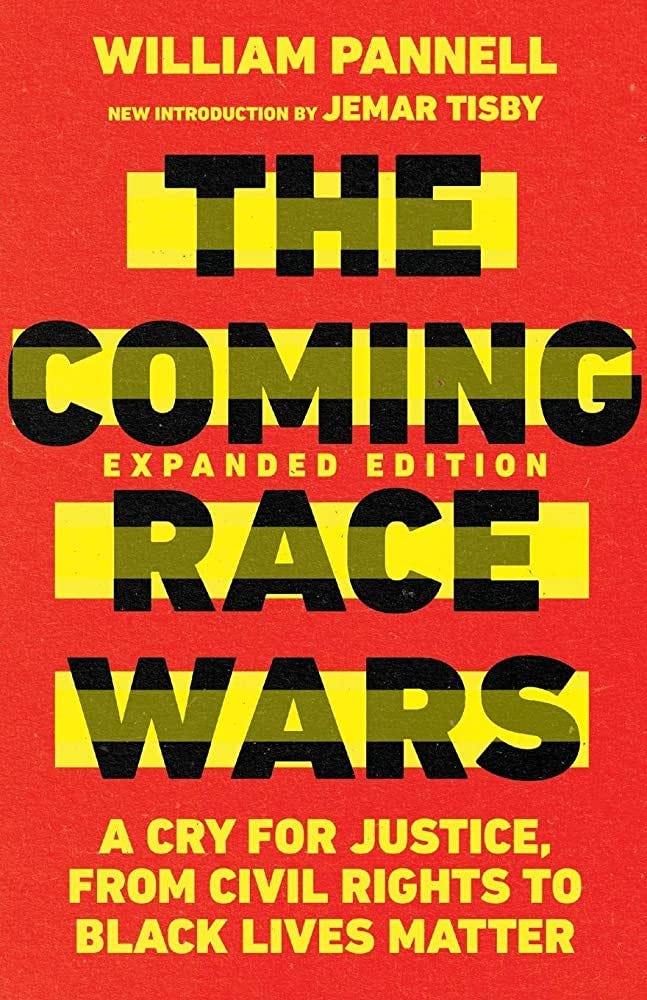Esteemed Retired Board Member and Black Evangelical, Dr. William E. Pannell, Supports Taylor University Professor
Pannell offers his insights gleaned from more than half a century of working with white evangelicals
You’ve helped make “Footnotes” a top-10 Substack in the “history” category! But the rankings are always changing, and we can quickly lose this distinction. Would you consider becoming a paid subscriber today?
William E. Pannell, has been a mentor to me for the last several years. He graciously allows me to visit him in-person at his home in southern California. I call him frequently for updates and advice.
It was the honor of my writing life to write a new introduction to his revised book The Coming Race Wars: A Cry for Justice, from Civil Rights to Black Lives Matter.
When I was implicated in the dismissal of Taylor University professor, Julie Moore, I sent him an article about it and asked for his input.
I was surprised to learn that not only had Dr. Pannell heard of Taylor University, he had served on the Board of Trustees for several years.
When he learned of the decision not to renew Moore’s contract because she taught about racial justice in a themed composition course, he decided to lend his signature to an open letter in support of her.
I also asked Dr. Pannell to share some of his thoughts on race, evangelicalism, and Christian higher education from his perspective as a long-time participant and analyst of such dynamics.
His first book, My Friend, The Enemy (1968), was one of the first by a Black evangelical to directly and publicly describe the Black experience in white evangelical circles and call them to account for their complicity with racism.
Dr. Pannell has a long and prestigious career as an evangelist working with Tom Skinner, as a singer and worship leader, a professor, and a Board Member of Fuller Theological Seminary. In honor of his service to higher education, Fuller renamed its center the William E. Pannell Center for Black Church Studies after him. He turns 94 years old this summer.
Below are some remarks from Dr. Pannell. They have been lightly edited for clarity.
What is your relationship to Taylor University? How did it start?
I am a retired member of Taylor's Board. This allows me the privileges of attending the meetings, but I cannot vote. Since I seem to have gotten older, I haven't attended a Board meeting in years. I did preach in the chapel there in 2016 and afterward was awarded the University's top award The Legion of Honor. I did enjoy the goodwill of the school for all the years I was a Board member. Oh, and I delivered a commencement address one year when they granted me an honorary doctorate.
What was the racial climate and conversation at Taylor when you became a board member? Was it any different there than at other Christian higher ed. institutions?
Jay Kesler left the presidency of Youth for Christ (YFC) to become the President of Taylor University [in 1985]. I was the chairman of the Board of YFC when he made the transition. Jay and I have been fast friends for many years. So he invited me to join the Board at Taylor.
He probably asked me because the university was thinking about opening an urban campus in nearby Ft. Wayne, IN. We did. It didn't work because of financial reasons but also because the constituency of the university had little vision for an urban campus.
The racial climate in the late 90's and early-mid 2000's was similar to now but latent. Taylor is in the country. The society had gone urban. That was one thing. Then when the urban campus closed, the culture wars heated up and Taylor's white Republican constituency didn't know what to do.
Then in 2019, this Republican segment invited Vice President Mike Pence to deliver the commencement address. The place has not been the same since. Faculty were upset; some walked out, but the parents and grandparents of the students gave Pence three standing ovations.
Yet the heat resulting from Pence’s presence was so intense among some constituents, faculty and students, that the then-president of the school, Lowell Haines, resigned a month later.
You’re not new to this kind of pushback from evangelicals when it comes to race. How is what we’re seeing in Christian higher ed now similar or different to what you experienced in decades past?
What we're seeing today is the dying gasp of an older fundamentalism attempting to save the world from those liberals, immigrants, and others.
We're watching an older and not-so-old generation of white evangelicals who think they are losing their country and their schools to “THEM”. Their last stronghold, in their eyes, are these Christian universities, Bible Colleges, etc.
Can places like Taylor change for the better on issues of racial justice and if so, what will it take?
I am encouraged by the response to this current flap. Students, grads, ex-Board members and more have rallied around professor Julie Moore. It will be interesting and crucial to see how the Board responds. They should find new leadership. Are you looking for a new post, Jemar?






I think it will require the kind of hard soul-searching few in these institutions seem willing to do. The parents, grandparents, and donors view these places as theirs, as Dr. Pannell noted; and, since their “siege” mentality is daily reinforced by conservative media and their church, short of some incitement that shakes their foundation I don’t see it changing.
I have hope that someday Christians will look at New Testament scriptures with new eyes and see how Jesus included and valued everyone. They will search deep within and see that we are all God’s creation. There is much work to do, but it begins by us truly seeing it, valuing it, acting on it.